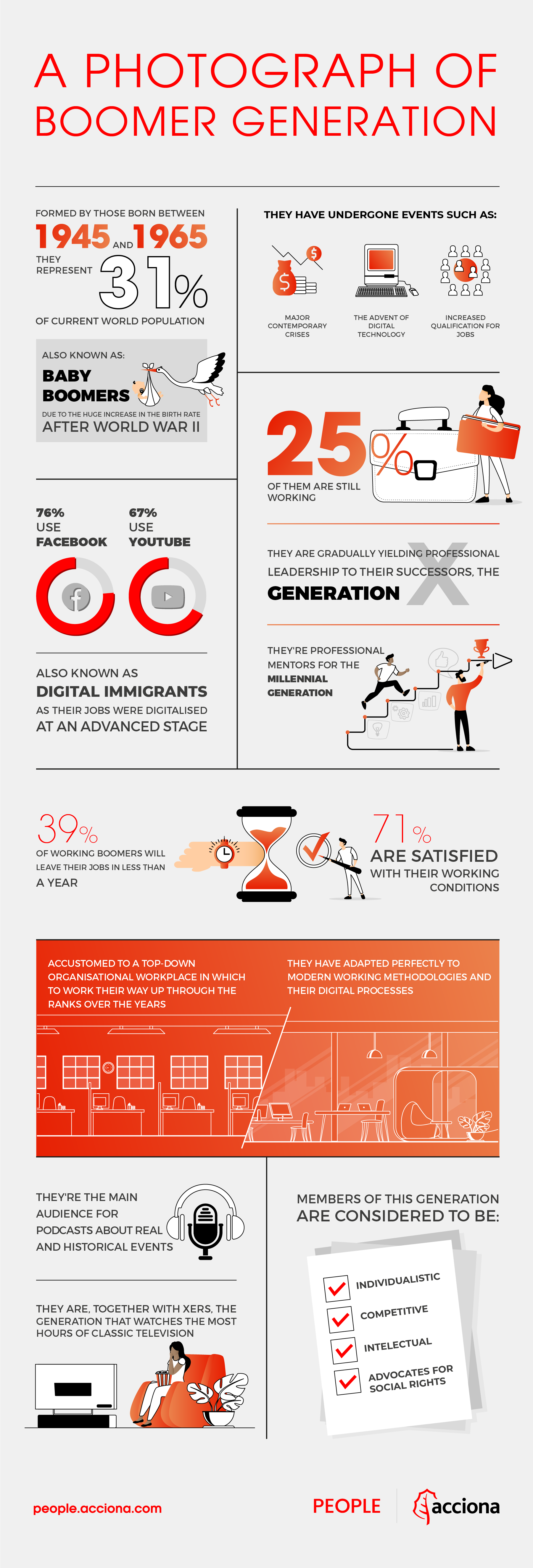“I am very satisfied with my working life. I think I will miss everything I’m learning right now with the advancement of technology and digitalisation in my company”. Stories like Carmen’s, who is 64 years old and about to retire, are an example of how the Baby Boomer generation has performed its work from the 1960s to the present day.
And Carmen, like her generational peers, has not had it easy. 35 years in the same multinational, rising little by little to become head of her department, surviving several global crises that shook her job stability in the process. A family waiting at home, consisting of a husband, two children, a dog and a mother to look after. And still with that spirit, willing to keep on learning. In other articles we presented the different work motivations of generational groups X, Y and Z, and now it is time to analyse how the baby boomer generation relates to their work environment.
Who makes up the baby boomer generation (and why there are so many of them)
This generation, born from the mid-1940s to the mid-1960s, is the result of a global desire to prosper and start a family. As this Forbes article reveals, “Baby Boomers are, to date, the largest generational group in the United States”. A story that is repeated in the rest of the world, especially in China, Central Europe and Canada.
This generation is considered to be the first to make a major qualitative leap compared to the previous one. Boomers knew that, being so many, they would have to be the best to achieve their goals. And they were for their entire careers, always engaged in a continuous learning process.
Why we owe so much to the Baby Boomers
They are therefore a generation that works hard and consistently to defend their individual stance. Professional achievement has been a lifelong goal, climbing the ladder to achieve recognition, both their own and that of others. They’re work-focused, but with a “work ethic”, a term they coined and which has survived to the present day. Are baby boomers competitive at work? Yes, it’ s quite a characteristic. Do they use malpractice to get higher? No, they prefer to achieve it by working hard and staying in the same job for years.
Nor should we forget their commitment to social causes. They are the first to champion the fight for working women’s rights, diversity in teams and, the closest to generation X when it comes to defending a new model of work and family. Thanks to this, Carmen is able to visit her mother on Tuesday afternoons, her carer’s day off, or was able to arrive later in March 1994, when her children’s school run was temporarily suspended.

Just a note: Carmen has Twitter and LinkedIn. She follows recipes from blogs and YouTube videos and likes to relax by listening to ASMR (whispers and sounds of objects with the aim of relaxation). “I think there’s a prejudice against us and technology, especially among young people. Just because we weren’t born in the 2000s or with the latest generation of mobile phones on our hands doesn’t mean we don’t know how to use them”. The Boomer generation was the first to see how the Internet changed their patterns, and most of them have adapted perfectly to the new digital era. An effort to add to their long list of “done”.
The legacy of the Boomer generation
Understanding a generation that is gradually disappearing from professional circles is a complex task. They are considered old, too correct, alien to today’s world. “Ok Boomer” is nowadays used to respond on social networks to the opinions of older people or to more conservative ideas. But, as we have seen, these prejudices are overshadowed when we see how they paved the way for later generations, and how they earned their voice over the previous ones.
Their predecessors, the Silent generation, born before 1945, were considered the first generation with common, globalised characteristics. Strongly attached to norms, both social and professional, and highly aligned in their workplace. The Boomer generation broke with this, proving that it was possible to climb the career ladder by being a skilled and unique professional.
Generation X and millennials should also value their legacy. They really aren’t that different from the baby boomers. Generation Xers strived for a work-family model that their parents did not have, and they changed jobs more frequently. An evolution of climbing the career ladder, but in a more cross-cutting way.
Generation Y brought back that social struggle on the wings of diversity and inclusion at the workplace, adding all those demands that would achieve a better world. And, like the Boomer generation, millennials are individualistic and seek professional recognition, both self and external. They don’t seem to be so different from the baby boomers once the blindfold of prejudice is removed.
What does seem to be the case is that Carmen and the rest of her senior colleagues are handing over the baton to the younger ones. “I am calm. I’ve had several trainees under my wing, many junior assistants that I have seen grow here or outside this company. They deserve the opportunity they gave me back in the day“, she concludes, before taking a last look at the workplace where she has grown professionally and personally.
Sources: Forbes, HBR, The Balance Careers


